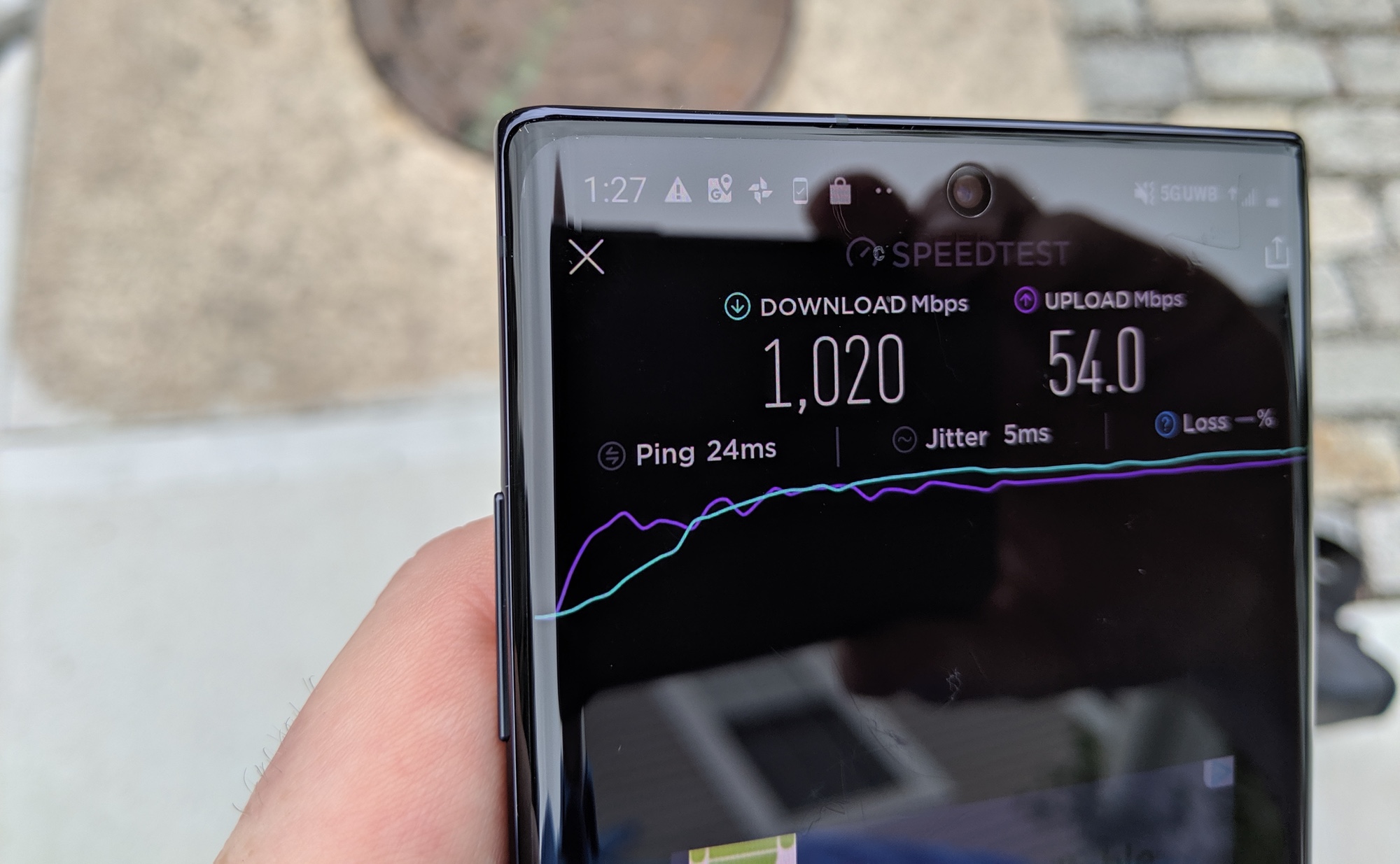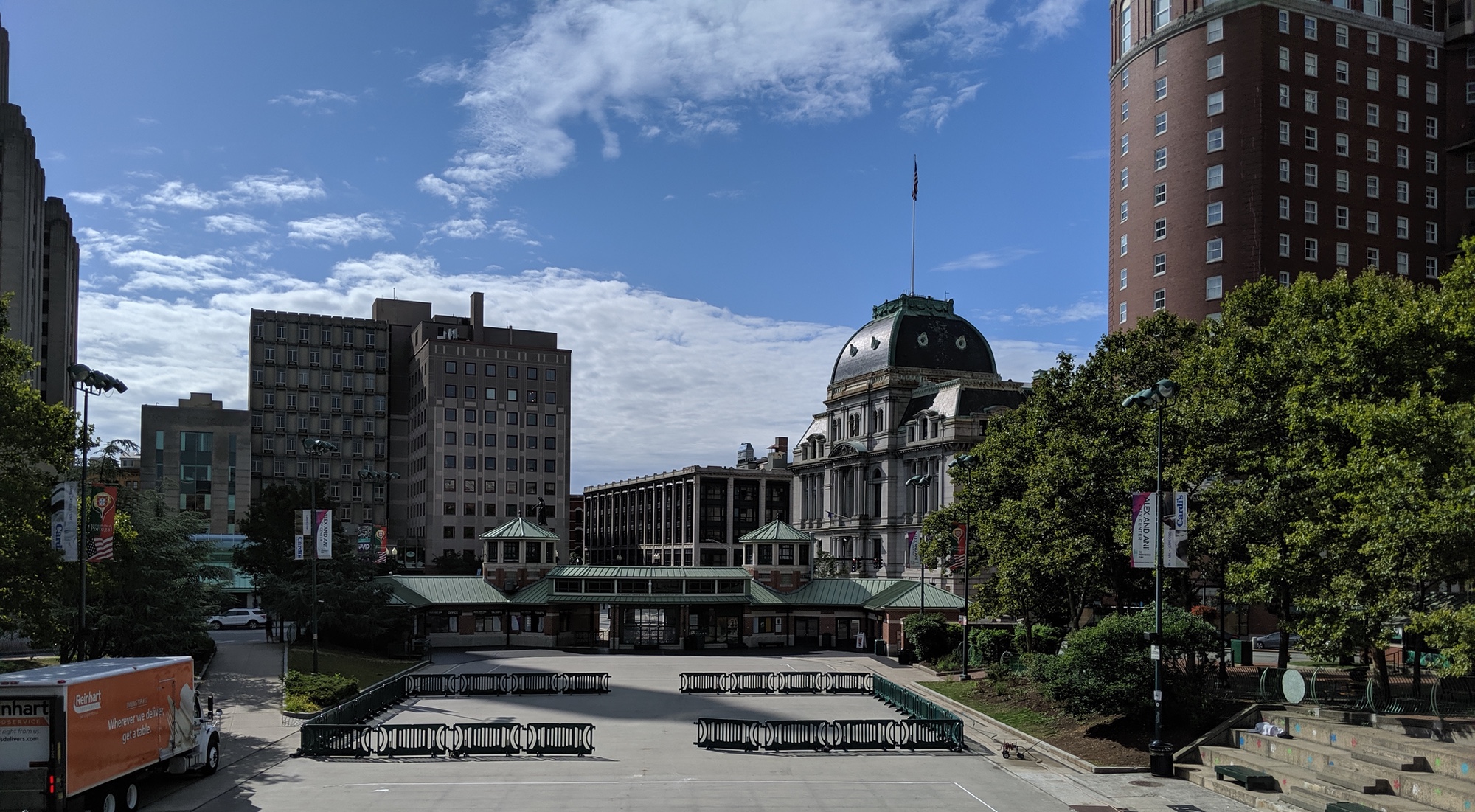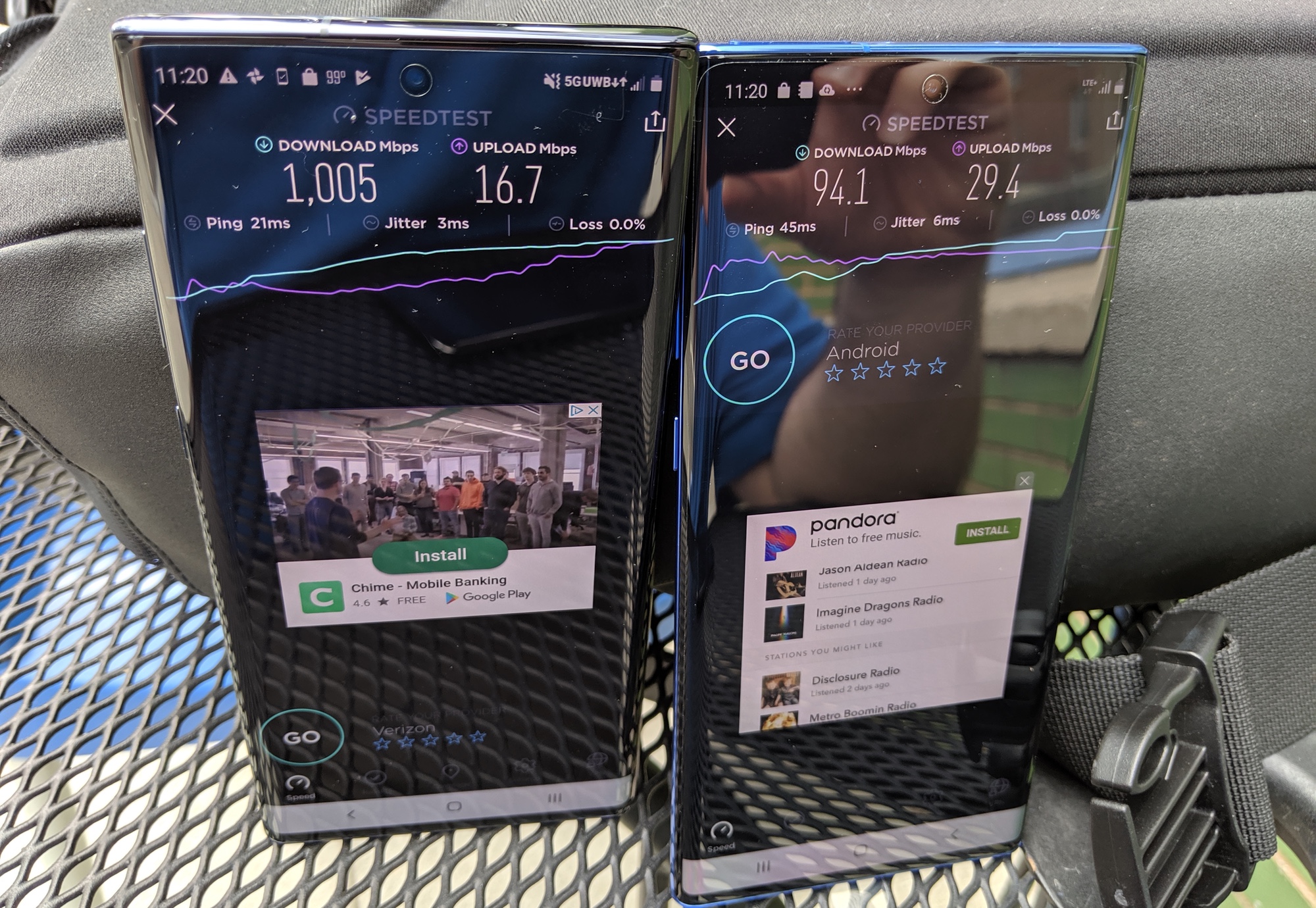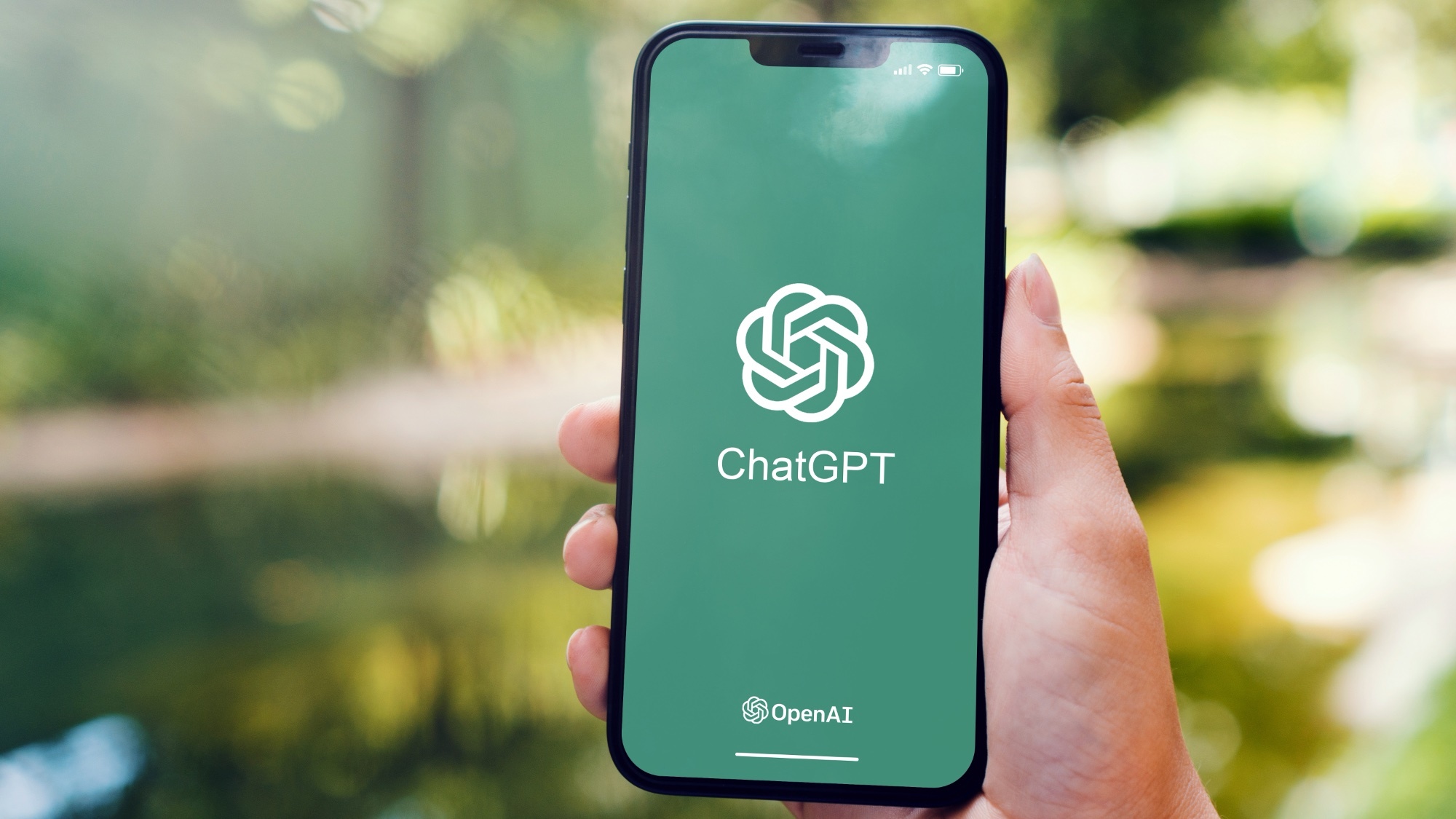Galaxy Note 10 Plus 5G Tested: 1 Gbps Speeds — When You Can Connect
Amazingly fast, inconsistent connectivity

PROVIDENCE, R.I. — Samsung has a new 5G-capable smartphone, the Galaxy Note 10 Plus 5G. But although the names and some of the specs have changed from the Galaxy S10 5G, which came out earlier this year, the performance story remains the same.
The Note 10 Plus 5G delivers blazingly fast download speeds — provided you can get a good connection.
The connection in this case comes from Verizon 5G, as the carrier is the exclusive home of the Galaxy Note 10 Plus 5G at the moment. (The phone is coming to other carriers, including AT&T and T-Mobile later this year.)
Verizon sells the Note 10 Plus 5G for $1,299, or $36.11 per month if you prefer to pay in 36 monthly payments. That's $200 more than the regular Galaxy Note 10 Plus, with the Snapdragon X55 modem inside the 5G version the only real difference between the two Note 10 Plus models.
Is that 5G connectivity worth the extra cash? When everything's humming between Samsung's phone and Verizon's network, it sure feels like it. At several stops during my testing in Providence, Rhode Island, I saw download speeds topping 1 Gbps, and even the slower results over 5G were substantially faster than what I saw from a Note 10 Plus connecting to LTE. But Verizon's 5G network remains limited to select neighborhoods, and performance lagged toward the end of my testing.
Here's what I found while taking the Galaxy Note 10 Plus 5G out for a test drive and how its performance compares to other phones.
- More: Make the most of 5G speeds with a fast VPN
5G in Providence
Verizon flipped on its 5G service in Providence at the end of July, making Rhode Island’s capital one of 10 cities that now have 5G access on Big Red's network. (Verizon claims that more than 20 additional cities will be added to those ranks before the end of the year.) But don't take that to mean that 5G connectivity is available throughout those cities.
Sign up to get the BEST of Tom's Guide direct to your inbox.
Get instant access to breaking news, the hottest reviews, great deals and helpful tips.
Verizon has limited its initial deployment to just a few areas in each city. In Providence's case, that includes Federal Hill, the neighborhood near Brown University, and areas farther up Thayer Street.
As in its other cities, Verizon is using millimeter-wave technology for its 5G network in Providence. That means fast speeds, as you'll see below, but it also means you've got to be in sight of one of Verizon's 5G towers. For that reason, coverage can vary from spot to spot, and forget about picking up a 5G signal indoors (though Verizon's working on that).

To see how the Galaxy Note 10 Plus 5G performed on Verizon's 5G network, the carrier lent me one of Samsung's phones for a four-hour test drive. I also brought along a regular Note 10 Plus so I could gauge whether the 5G phone could significantly outpace a comparable 4G device.
Toward the end of my testing session, it began to rain, but I'm not sure that affected my results so much as it did my disposition. A Verizon representative told me that only rain that completely obscures visibility would disrupt 5G connectivity.
Galaxy Note 10 Plus 5G speed results
Verizon 5G is pretty darn fast, as you'll know if you've seen the results of our previous speed tests in Chicago. And the 5G version of the Note 10 continues that tradition. At my first stop — at the corner of Thayer and Bowen, just below where a 5G node was located — the Note 10 Plus 5G saw download speeds ranging from 732 Mbps to 982 Mbps. In contrast, the LTE-equipped Note 10 Plus could only reach a 143 Mbps download speed, measured with Ookla.net's Speedtest app.
The best was yet to come, though. A block away in front of Blue State Coffee, my Note 10 Plus 5G recorded a 1.2 Gbps download speed in one test — the fastest I reached all day. That was more than 10 times faster than the Note 10 using LTE, which didn't even crack 100 Mbps. Speed improvements like that are what 5G is all about.
All told, at four of my test spots, the Note 10 Plus 5G offered download speeds in excess of 1 Gbps. In every location, it dusted the LTE version of the phone. At the corner of Thayer and Harold, that Note 10 Plus turned in its best LTE performance with an average download speed of 220 Mbps. On that same corner, the Note 10 Plus 5G averaged 1.006 Gbps.
| Location | Galaxy Note 10 Plus 5G Average Download Speed | Galaxy Note 10 Plus Average Download Speed |
| Thayer and Bowen | 870 Mbps | 136 Mbps |
| Blue State Coffee | 1,066 Mbps | 89.8 Mbps |
| Thayer and Oliver | 988 Mbps | 183 Mbps |
| Thayer and Benevolent | 497 Mbps | 130 Mbps |
| Thayer and Harold | 1,006 Mbps | 220 Mbps |
But toward the end of the day, test results became more erratic. At the corner of Charlesfield and Brown, across the street from one of Verizon's 5G nodes, the Note 10 Plus 5G recorded a 772 Mbps download speed. But just a few minutes earlier, at that same spot, it had turned in a speed of 315 Mbps. That's a pretty wide swing.
The most disappointing stop was at a block away at Brown and Benevolent, where the Note 10 Plus 5G topped out at 161 Mbps and couldn't complete our download tests. For my last hour with the Note 10 Plus 5G, the phone was overheating constantly, which definitely had an impact on performance.
In fairness, you're unlikely to repeatedly run speed tests on your 5G phone for several hours at a time. But if you're paying $1,299 for a phone, you are going to expect it to stand up to the demands of everyday use, and we never see this kind of overheating on LTE devices.
Galaxy Note 10 Plus 5G real-world tests
Running a speed-testing app gives you some numbers that can provide context for the performance gains you're likely to enjoy from 5G. But what does that mean in terms of real-world usage? To answer that question, I conducted a series of downloads — first, an episode of Nailed It! off Netflix (the 33-minute “The Marvel Episode” that begins Season 3) and then the beefy PUBG Mobile app off of Samsung’s Galaxy Store.

The Note 10 Plus 5G was up to the task of these downloads wherever the 5G network was strong. For the Netflix download, my first stop at Thayer and Bowen produced the Note 10 Plus 5G's slowest result, as it took 18 seconds to download the complete episode. In most locations, the Nailed It! Download finished in 5 to 6 seconds.
That's blazingly fast, compared with LTE. Our regular Note 10's fastest download time was 7 minutes, 15 seconds, but most of the time, downloading the episode took more than 8 minutes. On more than occasion, I had to stop the test, like at Thayer and Benevolent when the download hadn't even reached the halfway mark after 8 minutes.
Our PUBG downloads were similarly speedy over 5G. In three locations, the Note 10 Plus 5G downloaded the app in less than 30 seconds. In other instances, the download took anywhere from 40 seconds to 1 minute, 34 seconds. Our Note 10 Plus broke the 2-minute download mark for PUBG Mobile at one stop (Thayer and Harold, where download speeds topped 200 Mbps over LTE). But apart from that 1 minute, 35 second download, the LTE phone took anywhere from 2:09 to 3:34 to finish.
But not every test location produced download test results. At Charlesfield and Brook, I couldn't download PUBG Mobile on 5G, and the phone overheating issues at Brown and Benevolent forced me to scrap my download tests.
5G availability
Sporadic 5G coverage reflects more on a network than on a phone like the Galaxy Note 10 Plus 5G. Still, the ability to stay connected to a 5G signal is something you need to consider when deciding whether to pay the premium that 5G-enabled phones currently command.

I made 12 stops in Providence during my time with the Note 10 Plus 5G. At two of those stops, I couldn't detect a 5G signal. At two others, I started testing, only to have the scrap my results when the 5G signal proved too inconsistent to get meaningful numbers. And on two other occasions (noted above), I was unable to complete downloads over 5G, either due to network troubles or the phone getting too hot to continue.
That's half my testing stops where I ran into issues with 5G. Some hiccups are to be expected when rolling out a new network, and Verizon's coverage will undoubtedly improve over time. But the same inconsistencies with coverage that we've seen in previous stops were on display here, too.
Note 10 Plus 5G outlook
5G connectivity is a big part of the Note 10 Plus 5G's appeal, but it's not the phone's only feature. It has the same camera setup as the Note 10 Plus as well as the same Snapdragon 855 processor and 4,300 mAh battery. We plan to test those features, too, once we get more time with the phone.
But 5G is right there in the name of this phone, and so 5G performance is going to weigh heavily on whether people decide to get this particular Note 10 model or to opt for the less expensive LTE versions. Based on our initial 5G testing with this device, the Note 10 Plus 5G runs into the same issues we had when we reviewed the Galaxy S10 5G. As promising as those faster 5G speeds are, they're available in such limited areas and bursts that it's hard to justify the premium price tag at this point.
Philip Michaels contributed to this report.
Matthew Murray is the head of testing for Future, coordinating and conducting product testing at Tom’s Guide and other Future publications. He has previously covered technology and performance arts for multiple publications, edited numerous books, and worked as a theatre critic for more than 16 years.

